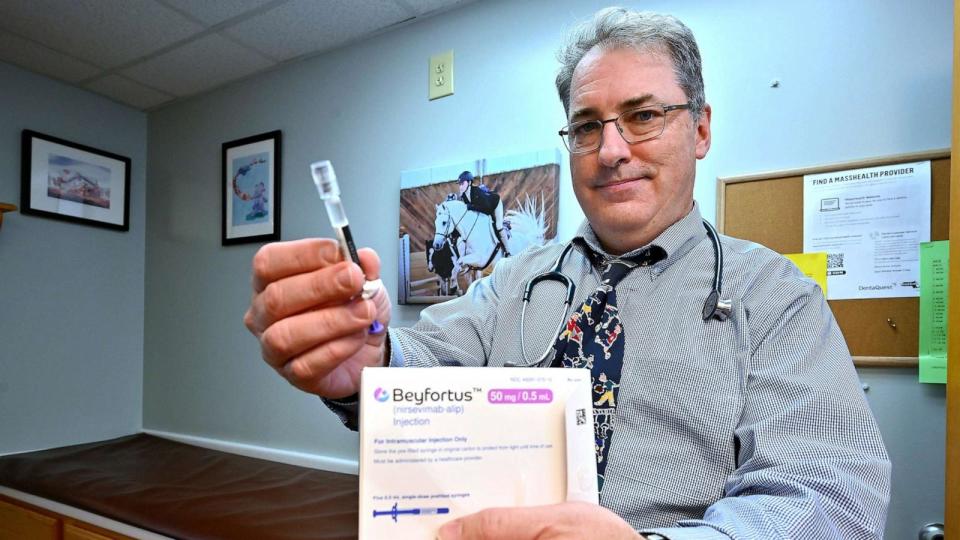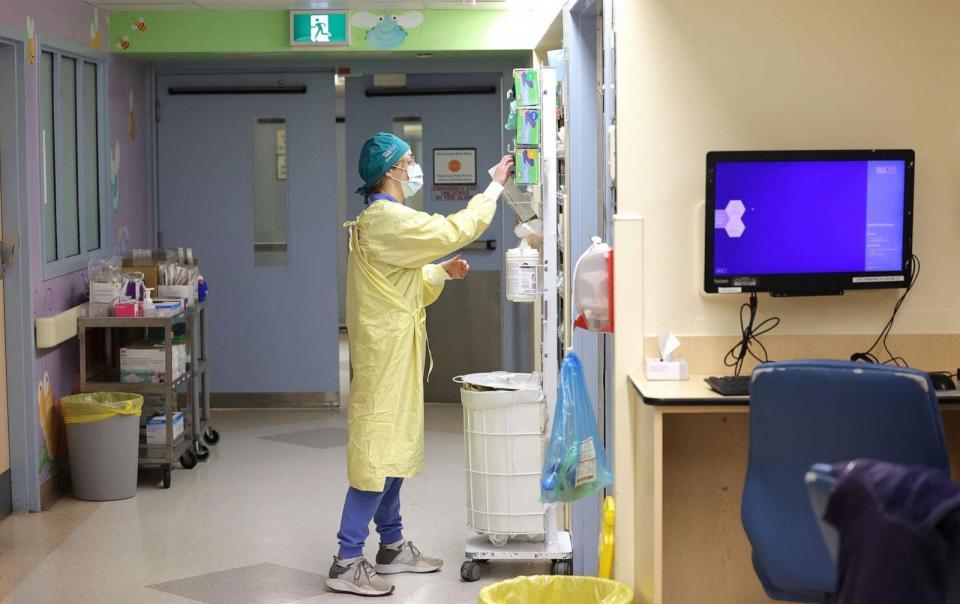Critics say a fumbled rollout of the brand-new RSV shot for babies has pediatricians worried and frustrated
Entering what could be another bad RSV season, pediatricians are sharing growing concerns about persistent shortages of a crucial new drug that was touted as a game-changer.
Respiratory syncytial virus (RSV) is a common respiratory virus that kills hundreds of young children each year and hospitalizes thousands, according to the Centers for Disease Control and Prevention. Last year, the virus circulated in higher numbers, and the CDC predicts a similarly bad season this year.
Officials from the Biden administration on Thursday met with manufacturers and partners of RSV immunizations including Sanofi, AstraZeneca and Thermo Fisher, urging them to speed up production to meet demand for immunizations and make more RSV available for infants.
Newborn babies less than 6 months old, babies born prematurely or those who have underlying health conditions are at highest risk. American Indian and Alaskan Native children are disproportionately at risk, even into the second year of life, according to a recent study published in Pediatrics.
This year, a new tool with promise to turn the tide against infant RSV hospitalizations – a monoclonal antibody shot called nirsevimab. In August, CDC Director Dr. Mandy Cohen celebrated the recommendation as "a powerful tool."

MORE: Mom's Facebook post warns others to not kiss babies after her infant contracts RSV
But now, doctors across the country say they are experiencing alarming shortages and are frustrated with the manufacturer, the pharmaceutical company Sanofi. The shortage led to the CDC stepping in on Oct. 13 to help triage doses distributed through the federal Vaccines for Children (VFC) program.
Dr. Nirav D. Shah, CDC principal deputy director, told ABC News that a temporary, 5-day pause on nirsevimab orders was implemented for the VFC program to ensure all states had equitable allocation of the shots. The VFC program offers shots to children eligible for Medicaid and those who are under or uninsured at no cost.
Shah said the CDC is continuing ongoing discussions with the shot's manufacturer and state health agencies to try to find solutions. A Sanofi spokesperson told ABC News they are "in close collaboration with the Centers for Disease Control and Prevention, which is working to ensure equitable distribution of available doses through the Vaccines for Children Program."
On Oct. 23, the CDC released a health alert that set new recommendations to help ensure vulnerable children could be prioritized amid the short supply. Among those groups were infants less than 6 months old and American Indian and Alaskan Native (AI/AN) children up to 19 months old.
"We are frustrated. Pediatricians are frustrated by this constant change [of recommendations], inequitable access, and the lack of availability," said Dr. Anita Henderson -- a pediatrician at The Pediatric Clinic, a service of Hattiesburg Clinic, and Forrest General Hospital in Hattiesburg, Mississippi, and the immunization representative, Mississippi Chapter, American Academy of Pediatrics.
MORE: CDC recommends 1st maternal RSV vaccine to help protect babies
"I do feel that we were promised that the rollout would be adequate supply and in time for the season," said Dr. Julia Arana, medical director, hospitalists team and chief of staff at East Tennessee Children's Hospital.
A Sanofi spokesperson told ABC News supply constraints were due to "truly unprecedented demand that outstripped our estimates." In addition to pausing all orders for the 100 mg doses of the shot, Sanofi said the lower 50 mg dose will also have allocation constraints in the private market.
"We previously communicated that new orders for the 100 mg dose were no longer being accepted, as the demand exceeded the available supply for the season. Currently, due to demand, we are carefully managing distribution of the 50 mg doses in the private market to fulfill existing orders and provide equitable access to remaining doses. Sanofi is in contact with providers about distribution plans," the Sanofi spokesperson said.
High demand was partially due to the weight-based dosing of the shot.

At the time of the rollout in September, most of the eligible babies less than 8 months old who were born ahead of RSV season would need to be given the larger, 100 mg dose instead of the 50 mg dose that's given to babies who weigh less than 11 pounds, creating a higher demand earlier for 100 mg doses.
MORE: CDC issues warning RSV is on the rise in young children in Southeastern US
"We knew there were going to be many barriers to implementation of nirsevimab that we were anticipating, and pediatricians have been working hard to overcome those barriers, but we were assured by the manufacturer that supply would not be one of the barriers," said Sean T. O'Leary, M.D., M.P.H., FAAP, chair of the AAP Committee on Infectious Diseases said in an AAP News release.
Doctors have to turn some babies away
Henderson said The Pediatric Clinic in Hattiesburg has only received supply through the VFC program but has yet to receive any stock of the shot for those with private insurance - meaning privately insured families who want the shot have been turned away.
"[Parents] are calling our offices or sending us messages daily and weekly asking for this product," Henderson said. "We want to give it to their babies, but we are unable in some situations, in some instances, to get that supply."
Dr. Alice Phillips, pediatrician and medical director for Ambulatory Quality at Cook Children's Health Care System in Fort Worth, told ABC News that their VFC ordering is still frozen due to allocation limits, so that supply is getting low in clinics.
Some hospitals have decided to prioritize shots for their most vulnerable babies, regardless of cost or insurance status and in some cases, the hospital absorbing the $500 cost, including Cooke Children’s, Phillips said. But they say supplies may not meet demand for these high-risk babies.
"We still have supply, how long that will last remains to be seen," Phillips said
East Tennessee Children's Hospital has received vaccines allocated by the VFC program, but Arana said they only have enough supply to immunize babies being discharged from the NICU. Still, it may not be enough. "I know that the numbers do not meet the demand at all." Arana said.
Short-term solutions may leave gaps
A federal health official told ABC News that progress is being made, with "tens of thousands" of doses expected as early as this week.
Transparency from the manufacturer has been a problem that likely prevented the CDC and Indian Health Service (IHS) from forming an equitable allocation plan from the start, said Dr. Laura Hammitt, director of infectious disease programs, Johns Hopkins Center for Indigenous Health and a principal investigator in a nirsevimab clinical trial.
"I think we were all told by the company that there would be sufficient supply. And I think that the number of doses available is not publicly known. And that lack of transparency is a problem," Hammitt said.
After speaking with several clinics that serve children across Navajo Nation, Hammitt says some sites have no supply and estimates less than half of these eligible children currently have access to the shot.
Dr. Sara Jager, chief of the department of pediatrics, Tuba City Regional Health Care Corporation (TCRHCC) in Navajo Nation, told ABC News she estimates their health system has less than half of the supply they'd need.
So far, TCRHCC has received 50 50-mg doses and 100 100-mg doses, but Jager said it's unknown when more supply will be available. "All across [Navajo Nation] we are having trouble accessing any more than that," Jager said.
In a statement to ABC News, IHS said they are advocating for equitable allocation of nirsevimab for AI/AN children and are collaborating with stakeholders including the CDC and the manufacturer to do so.
"We are committed to exploring all options and contingencies to ensure access to nirsevimab for our vulnerable pediatric service population," IHS said.
Dr. Jade A Cobern, M.D., M.P.H. is a neonatal hospitalist and member of the ABC News Medical Unit.
Critics say a fumbled rollout of the brand-new RSV shot for babies has pediatricians worried and frustrated originally appeared on abcnews.go.com

